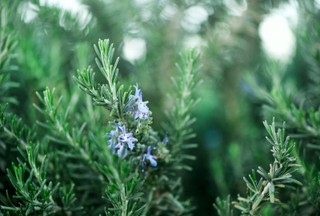Why herbs bolt and how to stop it

Anyone who has tried to grow herbs, or lettuce, or spinach probably has some experience with their plants bolting. Your plants are growing great, looking really healthy, and then all of a sudden they have what looks like a major growth spurt, sending a flower stalk shooting up towards the sky, and forming seed heads. This is bolting and it means in most cases your plant no longer tastes good.
So what exactly is bolting? Why does it change the flavor of your herbs (or plants)? And what can be done to fix it or prevent it?

What is happening when your herbs bolt?
When we think of something “bolting” we think of an animal or object that moves away quickly, usually when it’s in danger. While it may seem like a strange term, plants bolt in a similar fashion; it’s also a fight or flight response of sorts.
To clarify, bolting in plants is when they suddenly grow quickly, stop flowering and produce seeds.
For plants, it is a survival mechanism, usually triggered by temperatures warmer than the plant prefers, especially for cool-season herbs and veggies like spinach, lettuce, and arugula. These warmer temperatures or other abiotic stresses such as drought, changes in sun exposure, or lack of nutrients trigger a change in the internal plant hormones causing plants to adapt to the adverse environments.[1]
An herb will bolt because it thinks it is nearing the end of its life and it wants to produce seeds before perishing to carry on its genetic line. All of the resources internally will be translocated from the foliage and used to set seed, altering the flavor of the leaves.
Is it bad to have your herbs bolt?
Unfortunately, for some herbs, yes, it is bad if they bolt. It signifies the end of the herb’s life cycle and results in a reduced taste. The plant turns tough and woody instead of having tender leaves and stems making it undesirable to use for cooking or medicinal purposes.
Are there benefits of bolting?
In some cases, it is beneficial if your plants bolt.
If you’re nearing the end of the growing season bolting will cause the plants to produce seeds, encouraging them to reseed themselves naturally, increasing the chance seeds will germinate in the spring to produce new plants.
Also, when they bolt and form flowers the flowers can attract pollinators such as bees, butterflies, and hummingbirds to your garden.


The enthusiast's guide to herbs
We’re proud to present our new e-book, The Enthusiast’s Guide to Herbs! Learn everything you need to know about growing and caring for herbs indoors, including in-depth info cards for the 35 most commonly grown herbs.
Click the link below to find out more!
Herbs that bolt vs herbs that flower?
Fortunately, there are some herbs that will flower instead of bolting, and they don’t see a change in taste or the toughness/tenderness of the stems and leaves. Knowing which ones bolt and which ones flower without a change in their taste is important.
Bolting
Cilantro is probably the most problematic when it bolts. Bolting cilantro automatically becomes bitter and tough, rendering the plant inedible.
Watercress and arugula bolt, quickly making the leaves bitter. Well, in the case of arugula making the leaves even more bitter.
Parsley also bolts, but it doesn’t affect the flavor of the leaves so you can let it go to seed and then overwinter. You’ll be rewarded with more parsley the following spring.
Flowering
The following herbs can produce flowers without having it affect their flavor.
- Basil: No change in flavor. Pinch flowers when they appear and the plant will become bushier.
- Thyme, marjoram, and oregano: These flowers are fairly small and insignificant. You can actually eat them if you want, they don’t have much flavor.
- Mint: Flowers are edible, and their development doesn’t change the flavor of mint. Due to mint’s prolific growing nature, it’s best to pinch them off as well to prevent them from going to seed and reproducing.
- Chives: Flowering doesn’t affect the flavor at all, some varieties flower in the spring while others will flower on and off all throughout the season

What to do when your herbs bolt
Treatment for bolting will depend upon the herb you are growing. I wish there was a more concrete answer to this, but there isn’t.
In the case of cilantro, it’s too late to remedy the situation if bolting occurs. As soon as the plant begins to bolt it alters the flavor of the leaves. The best thing to do is to let the plant go to seed and collect it to use (this seed is known as coriander). Then start over with a new cilantro plant for the next year.
For plants like parsley, you can cut the flower stalk off and pinch back the plant to encourage foliage growth. The same goes for basil. Snipping off flowers encourages the basil plant to resume producing leaves, halting further bolting.
How to stop your herbs from bolting
Fortunately, there are some ways to help prevent your herbs from bolting. It may not stop it completely but may slow down the process, lengthening the lifespan of your plant.
- Cut off flowers as soon as you see the bud develop. Once the flower bud opens, it can alter the flavor of your herbs. Cut the stem all the way down to the node of the uppermost set of leaves. Continue to cut flowers off as the buds develop. Move your plant to a spot where the temperature is cooler.
- Harvest your herbs frequently. Unknowingly you often remove growing points on the plant that will develop into points that will bolt, or develop into flowers.
- Plant herbs in cool weather such as early spring, late summer, or early in the fall. Avoid planting them during the hot weather of the summer.
- Fertilize herbs regularly with a high-nitrogen liquid fertilizer to promote vegetative growth versus flowering. Phosphorus is the nutrient that triggers flower development and growth so look for a fertilizer with lower phosphorus levels.
- Mulch the soil surface around your plants, even plants growing indoors. This helps to regulate the temperature of the growing media, keeping the root system cooler. It keeps plants from recognizing high temperatures and may slow bolting.

Join our email club—get printable info cards free!
Sign up to receive our newsletter and get access to 10 printable plant info cards from our e-book for free. Also receive:
- $4 discount code for our Guide to Herbs e-book
- Semi-weekly plant inspiration & bite-size tips and tricks
Conclusion
Bolting is a process that occurs in herbs and some vegetable plants when temperatures become hotter than they’d like, causing them to grow quickly and produce seed heads, in a final attempt to carry on their genetic line. When it happens, many plants take on a bitter taste and the foliage becomes tough, rendering it useless. Understanding why it happens and trying to prevent it can keep your herb supply usable, longer, negating the need to replant.
Zhang, Y., Lv, Y., Jahan, N., Chen, G., Ren, D., & Guo, L. (2018). Sensing of Abiotic Stress and Ionic Stress Responses in Plants. International Journal of Molecular Sciences, 19(11), 3298. doi:10.3390/ijms19113298 ↩︎
